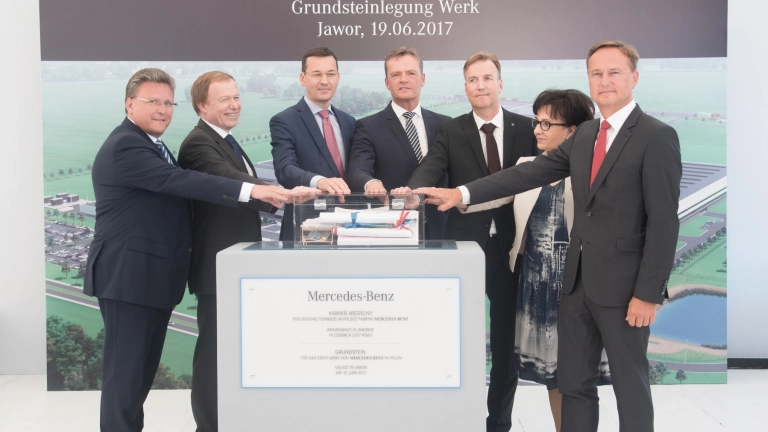Cornerstone laying ceremony in Jawor

Mercedes-Benz has started with the construction of its first plant in Poland which will set standards in latest production processes and innovative Industry 4.0. technologies within the global powertrain production. “The new engine plant in Poland is a key element in the growth strategy of Mercedes-Benz Cars. With the new site in Jawor, we are ensuring the efficient supply of our vehicle plants with highly efficient engines,” said Markus Schäfer, Member of the Divisional Board of Mercedes-Benz Cars, Manufacturing and Supply Chain. “We are aligning our global production network towards the future and show that we are able to do both sprint and marathon: due to high global demand, we will be producing conventional engines for hybrid vehicles and combustion engines in increasing quantities meeting Mercedes-Benz’s proven top quality, and at the same time we are preparing our production network for electric mobility in the long term.”
The new site in Jawor, comprising an area of around 50 hectares, is the second engine production plant run by Mercedes-Benz Cars outside of Germany. Daimler is investing around 500 million euros in the new production site for four-cylinder engines for Mercedes-Benz passenger cars; around 500 jobs will be created.
The official groundbreaking ceremony at the future plant site was attended by Mateusz Morawiecki, Poland’s Deputy Prime Minister and Minister of Economic Development and Finance, Elżbieta Witek, Member of the Council of Ministers, Tadeusz Kościński, Undersecretary of State at the Ministry of Economic Development of Poland, Rolf Nikel, Ambassador of the Federal Republic of Germany in Poland, Frank Deiß, Head of Powertrain Production Mercedes-Benz Cars and Site Manager of the Mercedes-Benz Untertürkheim Plant, Rainer Ruess, Head of production planning Mercedes-Benz Cars, and Dr Andreas Schenkel, CEO of Mercedes-Benz Manufacturing Poland, as well as other guests from the world of politics and business.
“We would like to welcome our Polish colleagues in the global powertrain production compound and we are looking forward to a close cooperation,” said Frank Deiß. “All of our sites are closely linked and benefit from the mutual transfer of expertise. This is how we ensure that proven Mercedes-Benz quality is maintained.” The qualification of the Polish employees is set to take place at the plant in Untertürkheim. In addition, employees from Germany will also be deployed on site to pass on their know-how to their Polish colleagues. The qualification concept for the new engine plant is also expected to include close cooperation with local Polish vocational colleges.
Mateusz Morawiecki emphasized: “Poland relies on foreign investors to strengthen our economic system with high-tech solutions. It is a very good news for all of us that Poland is a strategic investment location for a company like Daimler. The investment opens up entirely new business perspectives for numerous – especially regional – suppliers and also includes cooperations with universities and institutions for vocational training. Poland is becoming the European leader in terms of innovation and greenfield investment and is thus implementing one of the objectives of the Sustainable Development Strategy.”
Setting standards in the area of Industry 4.0 and Green Production
The engine plant in Jawor is expected to combine the latest sector standards with Industry 4.0 and act as a benchmark for engine production. Alongside state-of-the-art technology, digitisation potentials will also be exploited, for example with app-based applications in the areas of personnel and energy management. Responsive production systems are also expected to enable a flexible approach to production, thus making it possible to produce different engine variants on the same line.
“Here in Jawor we have the opportunity to build a new plant for modern and highly efficient engines based on advanced standards and in accordance with our specific requirements,” said Dr Andreas Schenkel. “We have had very good experiences in cooperation with our Polish partners from politics and business, and we are looking forward to the further good cooperation here in Jawor.”
The Jawor site is also expected to set standards in the area of resource-saving production processes: together with energy suppliers and local authorities, solutions for CO2-neutral engine production are being developed, for example through the use of wind power, solar energy or biogas applications.
“Germany is one of the most important economic partners in Poland. The construction of the engine plant will make a decisive contribution to the increase in attractiveness of the site in Lower Silesia. The high export rates and the expansion of the Daimler plant will surely be reflected in the development of the domestic economy,” says Tadeusz Kościński.
Engine production is scheduled to commence at the new site in 2019.